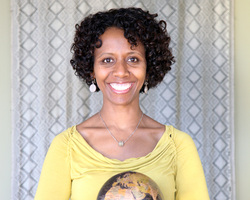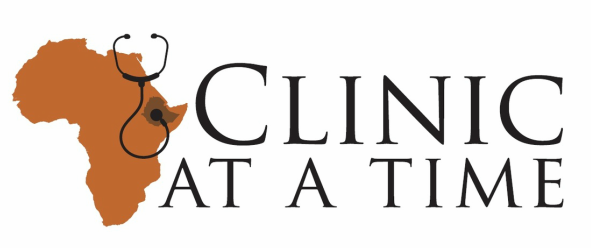
Re-imagining Medical Clinics in Ethiopia
By Meagan Parrish
By improving conditions at one rural clinic, Mulu Yayehyirad hopes to boost the health of many for good. At the Bichena Health Center, tucked into picturesque northwestern Ethiopia, two things never seem to abate: The buzz of flies and a long line of patients.
For those suffering from ailments common to the area—tuberculosis, malaria or AIDS—this is their only option. They wait for hours while in small rooms, thin, dirt-stained curtains separate those receiving care from the clinic’s stretched staff. Until recently, power would often go out, leaving women in labor with nurses who had nothing but the flicker of a flashlight to guide them.
It’s these images of health care in Ethiopia that have never faded from Mulu Yayehyirad’s mind.
Born and raised nearby, Yayehyirad lived a relatively comfortable life compared to many in the region. Her parents were business owners and her family one of the lucky ones who could afford better care. But her parents also passed along another gift—a lesson in helping others.
“They took in everybody who walked into their house,” she says, her voice light at the memory.
It was that example that perhaps inspired her to become a caregiver. Marrying and relocating to the United States, she became a nurse.
All the while, Yayehyirad never forgot Bichena. While the crippling famine that brought the country into the spotlight in the ’80s has faded from international view, the nation remains plagued by widespread poverty and poor access to decent medical care. Yayehyirad knew she could help.
“My eye-opener was seeing how medical supplies in [our] hospitals went to waste. I thought, ‘Wow, it would be nice to get these supplies back home,’” recalls Yayehyirad, now a researcher at the University of Wisconsin Carbone Cancer Center.
Yayehyirad imagined how to facilitate simple upgrades that would make a world of difference. The result is her nonprofit, Clinic at a Time.
Founded in 2007 and run out of her home, the name implies plans to improve clinics throughout Ethiopia one by one (a goal she holds for the future). But her current work is focused on Bichena, one improvement at a time.
Her first misson? To build a waiting room. The nondescript building lacked shelter for the 80 to 100 patients who arrive daily only to be left, literally, out in the cold.
“Many would get sicker just from going there,” Yayehyirad explains.
With the help of fundraisers, individual donations and proceeds from an Ethiopian cookbook she created, titled, “You Can Make Injara,” the waiting room was completed in 2009. Other improvements have followed, including a generator, new hospital beds and lab equipment. But Yayehyirad says there is more to be done.
“Sometimes I feel like I’m trying to scoop water with a teaspoon from the sea,” she admits.
At the top of her to-do list today is funding an ambulance to help those in remote areas access the clinic and building a dedicated childbirth room. And from there? Moving from this clinic to the next, improving the health of many as she goes. (MP)
By Meagan Parrish
By improving conditions at one rural clinic, Mulu Yayehyirad hopes to boost the health of many for good. At the Bichena Health Center, tucked into picturesque northwestern Ethiopia, two things never seem to abate: The buzz of flies and a long line of patients.
For those suffering from ailments common to the area—tuberculosis, malaria or AIDS—this is their only option. They wait for hours while in small rooms, thin, dirt-stained curtains separate those receiving care from the clinic’s stretched staff. Until recently, power would often go out, leaving women in labor with nurses who had nothing but the flicker of a flashlight to guide them.
It’s these images of health care in Ethiopia that have never faded from Mulu Yayehyirad’s mind.
Born and raised nearby, Yayehyirad lived a relatively comfortable life compared to many in the region. Her parents were business owners and her family one of the lucky ones who could afford better care. But her parents also passed along another gift—a lesson in helping others.
“They took in everybody who walked into their house,” she says, her voice light at the memory.
It was that example that perhaps inspired her to become a caregiver. Marrying and relocating to the United States, she became a nurse.
All the while, Yayehyirad never forgot Bichena. While the crippling famine that brought the country into the spotlight in the ’80s has faded from international view, the nation remains plagued by widespread poverty and poor access to decent medical care. Yayehyirad knew she could help.
“My eye-opener was seeing how medical supplies in [our] hospitals went to waste. I thought, ‘Wow, it would be nice to get these supplies back home,’” recalls Yayehyirad, now a researcher at the University of Wisconsin Carbone Cancer Center.
Yayehyirad imagined how to facilitate simple upgrades that would make a world of difference. The result is her nonprofit, Clinic at a Time.
Founded in 2007 and run out of her home, the name implies plans to improve clinics throughout Ethiopia one by one (a goal she holds for the future). But her current work is focused on Bichena, one improvement at a time.
Her first misson? To build a waiting room. The nondescript building lacked shelter for the 80 to 100 patients who arrive daily only to be left, literally, out in the cold.
“Many would get sicker just from going there,” Yayehyirad explains.
With the help of fundraisers, individual donations and proceeds from an Ethiopian cookbook she created, titled, “You Can Make Injara,” the waiting room was completed in 2009. Other improvements have followed, including a generator, new hospital beds and lab equipment. But Yayehyirad says there is more to be done.
“Sometimes I feel like I’m trying to scoop water with a teaspoon from the sea,” she admits.
At the top of her to-do list today is funding an ambulance to help those in remote areas access the clinic and building a dedicated childbirth room. And from there? Moving from this clinic to the next, improving the health of many as she goes. (MP)

 RSS Feed
RSS Feed